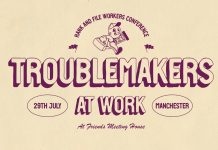A university admin worker writes about their job.
My job is boring. I’m an admin worker at a popular university in Northeast England. I’ve done the same job for several years. There have been developments and things I do differently, but mostly the job is the same. I answer email queries, update spreadsheets, navigate clunky and user-unfriendly database systems. I use all these methods to keep track of students and record their progress on our courses.
Occasionally I get a little satisfaction from designing a pleasing spreadsheet with conditional formatting that lights up in nice ways when you put in certain bits of information. Or when I perfect a mathematical formula to calculate automatically something which I could have calculated myself in less time than it took to write the formula – but it just feels better that way.
Most of the time I float through the day without using an ounce of initiative. Rarely do I come across a new or testing experience. Working with people is good. But all too often we communicate through a haze of workload pressures and stresses. Emails are the most common method of communication, and sometimes you can go for days without even talking to people in your office. We might as well all be robots.
It’s a rather sad environment sometimes. I want to interact with the people around me, but not in meetings or through computers. I don’t want to talk about how difficult it is to book the right rooms for our classes. I don’t want to moan about those students who always phone up asking about things which they wouldn’t need to pester us about if they would just check their student email address.
I want to talk about what people are interested in, what keeps them going. I want to go to the pub after work and really talk, get to know people. But this doesn’t happen often, and I can see why. After a day’s work, everyone is too frazzled to interact on a human level. The mind-numbing boredom, the lack of stimulation, or simply the workload pressures sap your energy and you just want to go home.
It’s also a sad fact that many admin jobs in universities are actually bureaucratic barriers to education. Rather than doing the tasks that can enable learning to take place, our jobs are about keeping track of students as they progress through a commoditised degree factory.
Often I wonder what working here twenty years ago might have been like. Before we had computers, many of the tasks we now do in minutes might have taken hours. Technological advances haven’t been used to make our working lives easier, they’ve been used to squeeze more productivity out of us. I reckon lots of what I do could be done by a sophisticated mobile phone app. But don’t say that too loudly, because under capitalism that means I’m out of a job, rather than I just get the afternoon off.
So why don’t I just get another job? Well that isn’t quite as easy as it was before the economic crisis. And I know it could be a lot worse. If I was a warehouse worker for Amazon, I’d have a device attached to my arm to measure my productivity.
So many people feel dissatisfied by the jobs they do. Take the former court typist who was fired for writing “I hate my job. I hate my job. I hate my job” over and over again instead of taking proper notes. It’s not just him. Jobs under capitalism are mostly crap, and often pointless. Whole industries exist purely to make already rich people richer.
The court typist’s protest against this has struck a chord with many of us keyboard daydreamers. But, sadly, all it did was get them fired. At a time of austerity and cuts and economic gloom, we find ourselves fighting just to defend our current working conditions. But we also need a vision of a world where work can be useful, challenging, and rewarding. As the saying goes: “we are all in the gutter, but some of us are looking at the stars”.





















Sunderland? administration will soon be passed over to the module leaders and lecturers who can do the admin via mobile/computer on evenings and weekends. This is the way it’s heading. We have to be serious, Marx efficent capitalist theories are more eviden tthan ever in this industry.
[…] Admin: the dullness of work – rs21 […]
I prefer to call and actually talk to someone than check my university email address. There’s no general information given out in lectures anymore, so when people are together, no-one knows who else knows about a special one-off event etc etc. if you read about something in an email, you’re rarely next to someone you can ask if they’re also going and if they want to come with you. The local use of email has destroyed communication. And it’s more boring.
Can totally relate to this article. Also, the trend (in my office anyway) to moving toward a style of work where you don’t see a project through to the end, but just perform the same tasks on a number of projects at the same time feels a lot like how I imagine it must be on a production line.
In my experience too, we have to account for our time, allotting our 8 hours per day against a particular task or project for it to be fed back into the budgets. This adds pressure but is “more efficient” for the company. Its things like that which compound the feeling that you have no control over your work. Most people spend the day with headphones in their ears just plugged into a screen.